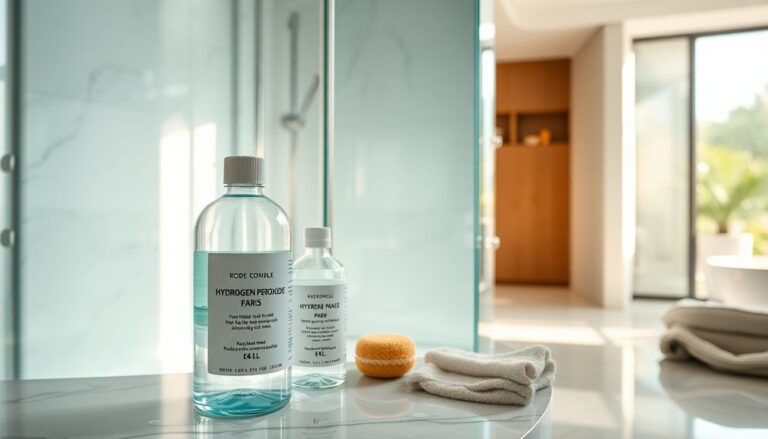Argomenti trattati
Eco-friendly shower cleaning with hydrogen peroxide
Cleaning the shower can often seem like a challenging task. The buildup of soap scum, mildew, and grime can be overwhelming. However, a powerful and eco-friendly solution is at hand: hydrogen peroxide. This versatile compound not only disinfects but also brightens surfaces, providing your shower with a fresh and clean appearance.
This guide will examine effective methods for utilizing hydrogen peroxide to clean every aspect of your shower, from the tiles to the tub. By implementing these techniques, you can maintain a hygienic and inviting space in your home.
Understanding hydrogen peroxide as a cleaning agent
Before exploring the cleaning capabilities of hydrogen peroxide, it is crucial to recognize the factors that contribute to its effectiveness. This compound contains oxygen, which is released upon decomposition, generating a powerful oxidizing effect. This characteristic not only aids in stain removal but also serves as a natural disinfectant, making it a suitable option for households with children and pets.
Why choose hydrogen peroxide?
Selecting hydrogen peroxide over conventional chemical cleaners presents numerous advantages. First, it is non-toxic, allowing for cleaning without concerns about harsh fumes or harmful residues. Furthermore, it is exceptionally effective against bacteria, mold, and mildew, making it particularly useful in bathroom settings. Its antimicrobial properties ensure that your shower remains hygienic while offering a natural alternative to commercial cleaning products.
How to clean your shower effectively with hydrogen peroxide
Understanding the benefits of hydrogen peroxide is just the beginning. Follow these simple steps to achieve a sparkling clean shower. This process is efficient and requires only a few supplies: hydrogen peroxide, a spray bottle, a scrub brush or sponge, and a microfiber cloth for drying.
Creating your cleaning solution
Begin by filling a spray bottle with hydrogen peroxide. The typical concentration available in stores is around 3%, which is suitable for cleaning. For more stubborn stains, you may opt for a higher concentration, but caution is advised. Once your spray bottle is prepared, you can start applying the solution to the surfaces of your shower.
Cleaning tiles and grout
Start by applying hydrogen peroxide generously to the tiles and grout. Allow it to sit for approximately 10 to 15 minutes. This waiting period is essential as it allows the hydrogen peroxide to penetrate the stains and disinfect the area. After the time has elapsed, use a scrub brush or sponge to gently scrub the surfaces. You will find that the grime and buildup lift away more easily, revealing the clean tiles underneath.
Finishing touches for a spotless shower
Once you have scrubbed the tiles and grout, turn your attention to the rest of the shower. Pay particular attention to the showerhead and faucet, which frequently collect mineral deposits and soap scum. Apply hydrogen peroxide to these fixtures and let it sit for a few minutes before wiping them down with a microfiber cloth.
Cleaning the tub
A clean tub is essential for a complete shower experience. Apply hydrogen peroxide to the tub’s surface and let it sit for approximately ten minutes. This process aids in lifting stains and disinfecting the area. Following this, scrub the tub thoroughly with a sponge and rinse with warm water to eliminate any residue.
Additional tips for maintaining your clean shower
To keep your shower looking pristine over time, consider establishing a weekly cleaning routine. A quick spray of hydrogen peroxide followed by a rinse can help prevent mildew and soap scum buildup. Additionally, ensuring proper ventilation in your bathroom can significantly reduce moisture levels, inhibiting mold growth.
Utilizing hydrogen peroxide as a cleaning solution can significantly enhance the cleanliness of your shower. Its disinfecting properties and straightforward application make it an effective choice for maintaining a fresh and hygienic bathroom without the need for harsh chemicals.

